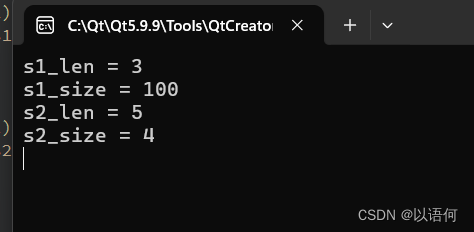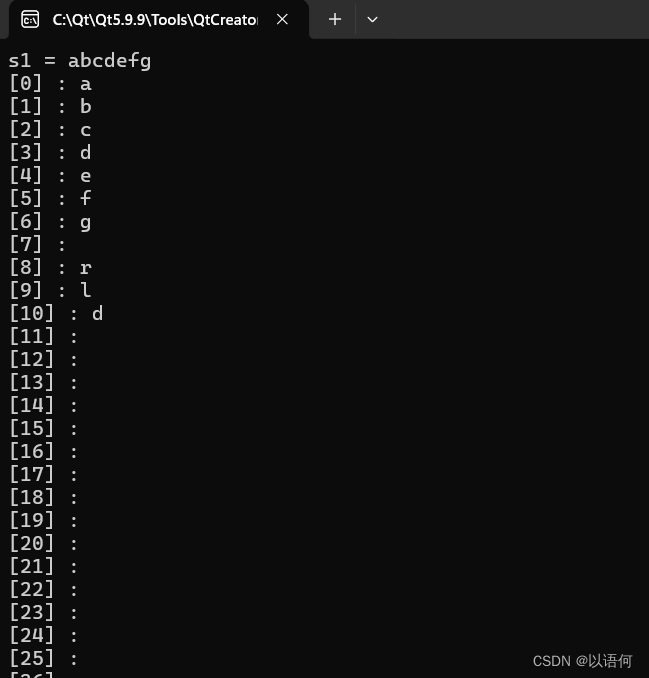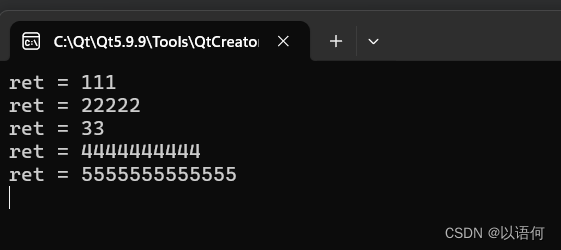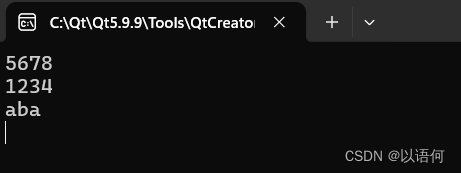一、获取字符串长度函数
#include <string.h>size_t strlen(const char *s);功能:计算一个字符串的长度参数:s:指定的字符串返回值:当前字符串的长度注意:strlen获取的字符串长度遇到第一个\0结束且\0不算做字符串长度之中
#include <stdio.h>
#include <string.h>
int main()
{
//使用strlen函数获取字符串的长度7 //strlen获取的字符串的长度遇到第一个\0结束
char s1[100] = "hel\0lo";
printf("s1_len = %d\n", strlen(s1));
printf("s1_size = %d\n", sizeof(s1));
char *s2 = "hello";
printf("s2_len = %d\n", strlen(s2));
printf("s2_size = %d\n", sizeof(s2));
return 0;
}
运行结果:

二、字符串拷贝函数
#include <string.h>char *strcpy(char *dest, const char *src);功能:将src复制给dest参数:dest:目的字符串src:源字符串返回值:保存dest字符串的首地址注意:使用strcpy函数复制字符串时必须保证dest足够大,否则会内存溢出strcpy是将src字符串中第一个\0之前包括\0复制给dest
char *strncpy(char *dest, const char *src, size_t n);函数的说明:将src指向的字符串前n个字节,拷贝到dest指向的内存中返回值:目的内存的首地址17 注意:1、strncpy不拷贝 ‘\0’2、如果n大于src指向的字符串中的字符个数,则在dest后面填充n‐strlen(src)个’\0’
#include <stdio.h>
#include <string.h>
int main()
{
//使用strcpy函数拷贝字符串
char s1[32] = "hello world";
//使用strcpy函数时,必须保证第一个参数的内存足够大
//char s1[5] = "abcd";
char s2[32] = "abcdefg";
strcpy(s1, s2);
printf("s1 = %s\n", s1);
int i;
for(i = 0; i < 32; i++)
{
printf("[%d] : %c\n", i,s1[i]);
}
return 0;
}
执行结果:

三、字符串追加函数
#include <string.h>char *strcat(char *dest, const char *src);功能:将src追加到dest的后面参数:dest:目的字符串src:源字符串返回值:保存dest字符串的首地址
char *strncat(char *dest, const char *src, size_t n);追加src指向的字符串的前n个字符,到dest指向的字符串的后面。注意如果n 大于src的字符个数,则只将src字符串追加到dest指向的字符串的后面追加的时候会追加’\0’
#include <stdio.h>
#include <string.h>
int main()
{
//使用strcat函数追加字符串
char s1[32] = "hello world";
char s2[32] = "abcdef";
//strcat是从s1的\0的位置开始追加,直到s2的第一个\0复制完毕后结束
strcat(s1, s2);
printf("s1 = %s\n", s1);
return 0;
}
运行结果:


四、字符串比较函数
#include <string.h>int strcmp(const char *s1, const char *s2);int strncmp(const char *s1, const char *s2, size_t n);功能:strcmp是比较两个字符串的内容,strncmp是比较两个字符串的前n个字节是否一样 参数:s1、s2:要比较的两个字符串n:strncmp中的参数n表示要比较的字节数返回值:=0 s1 = s2>0 s1 > s2<0 s1 < s2
#include <stdio.h>
#include <string.h>
int main(int argc, char *argv[])
{
//使用strcmp比较两个字符串的内容是否一致
//strcmp函数一个字符一个字符比较,只要出现不一样的,就会立即返回
char s1[] = "hello";
char s2[] = "w";
int ret = strcmp(s1, s2);
if(ret == 0)
{
printf("s1 = s2\n");
}
else if(ret > 0)
{
printf("s1 > s2\n");
}
else
{
printf("s1 < s2\n");
}
return 0;
}
运行结果:

五、字符查找函数
#include <string.h>char *strchr(const char *s, int c);功能:在字符指针s指向的字符串中,找ascii 码为c的字符参数:s:指定的字符串c:要查找的字符返回值:成功:找到的字符的地址失败:NULL注意:s指向的字符串中有多个ASCII为c的字符,则找的是第1个字符
char *strrchr(const char *s, int c);功能:在s指向的字符串中,找最后一次出现的ASCII为c的字符
#include <stdio.h>
#include <string.h>
int main()
{
//使用strchr函数在一个字符串中查找字符
char s[] = "hel6lo wor6ld";
//找第一个匹配的字符
char *ret = strchr(s, '6');
//找最后一个匹配的字符
//char *ret = strrchr(s, '6');
if(ret == NULL)
{
printf("没有找到\n");
}
else
{
// 计算字符在数组中的位置
int position = ret - s;
printf("找到了,在数组的第 %d 个位置\n", position);
}
return 0;
}
运行结果:

六、字符串匹配函数
#include <string.h>char *strstr(const char *haystack, const char *needle);函数说明:在haystack 指向的字符串中查找 needle 指向的字符串,也是 首次匹配返回值:找到了:找到的字符串的首地址没找到:返回 NULL
#include <stdio.h>
#include <string.h>
int main()
{
//使用strstr函数在一个字符串中查找另一个字符串
char s[] = "1234:4567:666:789:666:7777";
//strstr查找的时候,查找的是第二个参数的第一个\0之前的内容
char *ret = strstr(s, "666");
if(ret == NULL)
{
printf("没找到\n");
}
else
{
printf("找到了,在当前字符串的第%d个位置\n", ret ‐ s);
}
return 0;
}
运行结果:

七、字符串转换数值
#include <stdlib.h>int atoi(const char *nptr);功能:将一个数字型字符串转化为整形数据参数:nptr:指定的字符串返回值:获取到的整形数据
#include <stdio.h>
#include <stdlib.h>
int main()
{
//使用atoi将数字型字符串转化为整形数据
char s1[] = "7856";
int ret1 = atoi(s1);
printf("ret1 = %d\n", ret1);
//使用atof将浮点型的字符串转化为浮点型数据
char s2[] = "3.1415926";
double ret2 = atof(s2);
printf("ret2 = %lf\n", ret2);
return 0;
}运行结果:

八、字符串切割函数
#include <string.h>char *strtok(char *str, const char *delim);功能:对字符串进行切割参数:str:要切割的字符串第一次切割,就传入指定的字符串,后面所有次的切割传NULLdelim:标识符,要根据指定的delim进行切割,切割的结果不包含delim返回值:返回切割下来的字符串的首地址,如果都切割完毕,则返回NULL
#include <stdio.h>
#include <string.h>
int main()
{
//使用strtok函数切割字符串
char s[] = "111:22222:33:4444444444:5555555555555";
char *ret;
//第一次切割
ret = strtok(s, ":");
printf("ret = %s\n", ret);
//后面所有切割时都要将strtok的第一个参数传NULL
while((ret = strtok(NULL, ":")) != NULL)
{
printf("ret = %s\n", ret);
}
return 0;
}
运行结果:

九、格式化字符串操作函数
#include <stdio.h>int sprintf(char *str, const char *format, ...);功能:将按照格式保存的字符串复制给str参数:str:保存字符串format:同printf返回值:保存的字符串的字节数
#include <stdio.h>int sscanf(const char *str, const char *format, ...);功能:scanf是从终端读取数据并赋值给对应变量,而sscanf是从第一个参数中读取数据参数:str:指定要获取内容的字符串format:按照格式获取数据保存在变量中返回值:成功获取的个数
9.1 sprintf和sscanf的基本用法
//sprintf和sscanf的基本用法
void test1()
{
char buf[20];
int a, b, c;
sprintf(buf,"%d:%d:%d",2013,10,1);
printf("buf = %s\n",buf);
sscanf("2013:10:1", "%d:%d:%d", &a, &b, &c);
printf("a=%d,b=%d,c=%d\n",a,b,c);
}运行结果:

9.2 sscanf高级用法
//sscanf高级用法
#include<stdio.h>
void test2()
{
//1、跳过数据:%*s或%*d
char buf1[20];
sscanf("1234 5678","%*d %s",buf1);
printf("%s\n",buf1);
//2、读指定宽度的数据:%[width]s
char buf2[20];
sscanf("12345678","%4s ",buf2);
printf("%s\n",buf2);
//3、支持集合操作:只支持获取字符串
// %[a‐z] 表示匹配a到z中任意字符(尽可能多的匹配)
// %[aBc] 匹配a、B、c中一员,贪婪性
// %[^aFc] 匹配非a、F、c的任意字符,贪婪性
// %[^a‐z] 表示读取除a‐z以外的所有字符
char buf3[20];
sscanf("aba33DajfDdFF","%[a-z]",buf3);
printf("%s\n",buf3);
}
int main()
{
test2();
return 0;
}
运行结果:

十、const
#include <stdio.h>
//const修饰全局变量
//此时全局变量只能使用但是不能修改,
//如果直接拿全局变量修改值,编译直接报错
//如果使用全局变量的地址修改值,运行时程序异常结束
const int a = 100;
void test1()
{
printf("a = %d\n", a);
//a = 666;
//printf("a = %d\n", a);
int *p = &a;
*p = 888;
printf("a = %d\n", a);
}
//const修饰普通局部变量
//可以读取变量的值
//不能直接通过变量进行修改值,编译报错
//可以通过变量的地址修改值
void test2()
{
const int b = 100;
printf("b = %d\n", b);
//b = 666;
//printf("b = %d\n", b);
int *p = &b;
*p = 888;
printf("b = %d\n", b);
}
//const修饰指针变量
//如果const修饰指针变量的类型,无法通过指针变量修改地址里面的值
//如果const修饰指针变量,无法修改指针变量保存的地址
//如果const既修饰指针变量的类型,又修饰指针变量,则只能通过原本变量修改值
void test3()
{
int c = 100;
//const修饰指针变量的类型
//const int * p = &c;
//const修饰指针变量
//int * const p = &c;
//const既修饰指针变量的类型,又修饰指针变量
const int * const p = &c;
printf("*p = %d\n", *p);
c = 666;
printf("*p = %d\n", *p);
*p = 777;
printf("*p = %d\n", *p);
int d = 888;
p = &d;
printf("*p = %d\n", *p);
}
int main()
{
test3();
return 0;
}





















 3万+
3万+

 被折叠的 条评论
为什么被折叠?
被折叠的 条评论
为什么被折叠?








